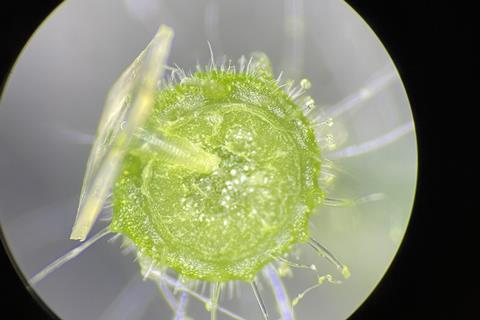Although pest control is important for agriculture, it can also create environmental problems. Micro-needles can offer a way to apply pesticides and nutrients more precisely.
In an article published in Nature Nanotechnology, researchers from the US and Singapore revealed an innovative method for delivering nutrients and pesticides directly to plants via micro-needles. The image shows a tomato stem being injected with a hollow micro-needle made from silk proteins. In this case, iron has been administered to the plant. In tomato plants, iron deficiency can lead to chlorosis, which reduces yield.

Microinjection provides a significant improvement in precision. Indeed, with traditional plant irrigation, 30–50% of the nutrients are released in the soil or air. This is inefficient and environmentally damaging. Injection, on the other hand, is much more targeted and has a minimal environmental impact.
Currently, this injection process is manual. However, according to the accompanying press release, research leader Benedetto Marelli of MIT sees great potential for this technique. He hopes to automate the process in the future using existing automated farming equipment.
Yunteng Cao, Doyoon Kim, et al., Nanofabrication of silk microneedles for high-throughput micronutrient delivery and continuous sap monitoring in plants, Nature Nanotechnology (2025), doi:10.1038/s41565-025-01923-2













Nog geen opmerkingen